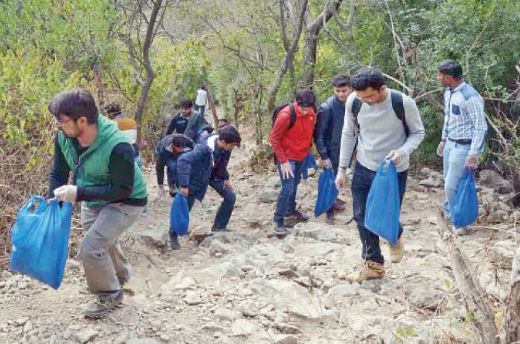DNA
Islamabad – More than one hundred university students and nature lovers participated in the hiking and cleanup drive at Margalla Hills Train-5 after an interactive session on wildlife and biological diversity of the Margalla Hills on Saturday.
It was the 13th Pakistan Mountain Festival’s daylong kickoff event, organized by the Development Communications network (Devcom-Pakistan), DTN and Islamabad Wildlife Management board (IWMB) in collaboration with the Comsats University Islamabad Campus Computer Science Adventure Society (CSAS). Pakistan Mountain Festival (PMF) is an annual flagship event of Devcom-Pakistan to commemorate the UN’s International Mountain Day (IMD) that falls on December 11.
Speaking on the occasion, Devcom-Pakistan Executive Director and founder Pakistan Mountain festival said the Margalla Hills National Park increasingly becoming a focus of visitors and illegal constructions. Solid waste management and littering have increased manifold despite many interventions by the IWMB and civil society organizations. The environmentally unfriendly practices have damaged the natural resources in all three parts of the National Park including hills, Rawal Lake and Sharkarparian despite many initiatives. Mountain Resources are the lifeline of the over 80 percent of the people living downstream who are responsible for heavy carbon emissions, and devastation of the mountain ecosystems.
Ahmed said we shall encourage youth for environmentally friendly outdoor pursuits. It is good for their mental and physical health besides making them a responsible visitor to nature. Several youth engagements are in pipeline for the 13th Pakistan Mountain Festival including 9th Pakistan Mountain Youth Forum and cultural shows, and a conference. We need to work out a joint action plan for the promotion of mountains and its communities, culture, art, and heritage instead of individual and scattered efforts.
The IWMB Deputy Director Sakhawat Ali briefed the participants about the rich biodiversity of the Margalla Hills National Park that was established in 1980. It is the third-largest national park in the world with an area of 17,386 hectares (42,960 acres) under the foothills of Himalaya. In the recent decade, its importance was realized after seeing the impact of unwanted haphazard constructions and movement of vehicles more than its carrying capacity. Many initiatives have been taken so far to protect the wildlife and biological diversity including awareness raising among the communities living in the habitats.
He urged the youth to respect diversity of species, and help manage wildlife and human beings live together. The park is rich in biodiversity, especially rich in Sino-Himalayan fauna, most notably gray goral, barking deer and the Leopard. Combined MHNP is home to around 600 plant species, 402 bird varieties, 38 mammals and 27 species of reptiles.
IWMB Deputy Director said under the new management recently the IWMB has taken many steps for the protection of the Park and visitors. Many cases of woodcutting and forest fires were averted. The renovated IWMB nature education centres are the hub of activities and awareness raising sessions, and community engagement.
Zamina Khan, a participant of the mountain cleanup, was of the view that it is quite healthy to go in nature. We continued the tradition of picking the trash from the mountain trail, and setting the example for those who do not care for the environment. Such activities shall continue, and we need to observe respect for nature, a habitat for thousands of living creatures. It is also a source of many essentials for human life as well.

















